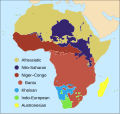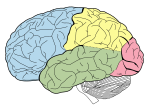Language change is the process of alteration in the features of a single language, or of languages in general, across a period of time. It is studied in...
24 KB (2,702 words) - 23:14, 16 September 2024
effects on language structure. One source of language change is contact and the resulting diffusion of linguistic traits between languages. Language contact...
137 KB (16,077 words) - 13:17, 20 November 2024
In language change, analogical change occurs when one linguistic sign is changed in either form or meaning to reflect another item in the language system...
9 KB (1,167 words) - 23:53, 22 November 2024
Historical linguistics (redirect from Changes in language over time)
of how languages change over time. It seeks to understand the nature and causes of linguistic change and to trace the evolution of languages. Historical...
22 KB (2,489 words) - 01:51, 23 November 2024
the proto-language undergoing different language changes and thus becoming distinct languages over time. One well-known example of a language family is...
35 KB (4,141 words) - 10:06, 25 November 2024
linguistics, phonological change is any sound change that alters the distribution of phonemes in a language. In other words, a language develops a new system...
39 KB (5,443 words) - 19:09, 22 November 2024
delimiters. In historical linguistics, a sound change is a change in the pronunciation of a language. A sound change can involve the replacement of one speech...
17 KB (2,334 words) - 04:35, 10 October 2024
Language Change: Progress or Decay? is a book on language change by Jean Aitchison in which the author concludes that language change is neither a process...
3 KB (123 words) - 15:19, 10 April 2024
Semantic change (also semantic shift, semantic progression, semantic development, or semantic drift) is a form of language change regarding the evolution...
26 KB (3,043 words) - 08:46, 8 July 2024
Rhotacism (redirect from Rhotacism (language change))
common may be of /z/ to /r/. When a dialect or member of a language family resists the change and keeps a /z/ sound, this is sometimes known as zetacism...
19 KB (1,885 words) - 11:42, 9 October 2024
linguistics, language death occurs when a language loses its last native speaker. By extension, language extinction is when the language is no longer...
41 KB (4,483 words) - 04:26, 18 November 2024
The number of languages natively spoken in Africa is variously estimated (depending on the delineation of language vs. dialect) at between 1,250 and 2...
79 KB (5,629 words) - 10:42, 20 November 2024
On Explaining Language Change is a 1980 book by Roger Lass in which the author examines various aspects of language change. The book was reviewed by Suzanne...
3 KB (142 words) - 15:28, 31 March 2023
Linguistics (redirect from Study of language)
of language, historical research today still remains a significant field of linguistic inquiry. Subfields of the discipline include language change and...
79 KB (8,966 words) - 16:20, 1 November 2024
Language convergence is a type of linguistic change in which languages come to resemble one another structurally as a result of prolonged language contact...
9 KB (1,025 words) - 16:35, 14 August 2024
proto-language is a postulated ancestral language from which a number of attested languages are believed to have descended by evolution, forming a language...
13 KB (1,688 words) - 00:28, 20 November 2024
Latin (redirect from Latin (language))
While often called a "dead language", Latin did not undergo language death. By the 6th to 9th centuries, natural language change eventually resulted in Latin...
102 KB (11,079 words) - 08:07, 25 November 2024
Word taboo (redirect from Taboo Language)
called taboo language, language taboo or linguistic taboo is a kind of taboo that involves restricting the use of words or other parts of language due to social...
13 KB (1,604 words) - 14:42, 4 June 2024
not change any existing dialect, which distinguishes koineization from the normal evolution of dialects. While similar to zonal auxiliary languages, koiné...
14 KB (1,588 words) - 17:50, 10 November 2024
Germanic language of the Indo-European language family, spoken by about 25 million people as a first language and 5 million as a second language and is...
190 KB (19,014 words) - 18:05, 19 November 2024
(/məˈrɑːti/; मराठी, Marāṭhī, pronounced [məˈɾaːʈʰiː] ) is a classical Indo-Aryan language predominantly spoken by Marathi people in the Indian state of Maharashtra...
105 KB (9,060 words) - 12:42, 24 November 2024
repetition, and change without conscious planning or premeditation. It can take different forms, typically either a spoken language or a sign language. Natural...
6 KB (590 words) - 07:11, 24 July 2024
primary language spoken in the Central Africa especially the Central African Republic, southern-Chad and Democratic Republic of the Congo. This language is...
23 KB (2,351 words) - 14:18, 5 October 2024
climate change includes both global warming—the ongoing increase in global average temperature—and its wider effects on Earth's climate. Climate change in...
310 KB (27,913 words) - 05:09, 23 November 2024
Variation (linguistics) (redirect from Language variation)
Variation is an essential component of language change. This is because language change is gradual; a language does not shift from one state to another...
25 KB (3,185 words) - 21:20, 24 August 2024
extinct language is a language with no living descendants that no longer has any first-language or second-language speakers. In contrast, a dead language is...
21 KB (3,192 words) - 17:14, 13 November 2024
Linguistic prescription (redirect from Language nazi)
to language change; if radical, it may produce neologisms. Such prescription may be motivated by attempts to improve the consistency of language to make...
47 KB (5,273 words) - 13:52, 25 November 2024
Prestige (sociolinguistics) (redirect from Prestigious language)
new language, known as a creole, language contact can result in changes, such as language convergence, language shift or language death. Language convergence...
45 KB (5,616 words) - 01:09, 19 October 2024
[Contributions to the 4th Essen Symposium on 'Language Contact, Language Change, Language Shift, Language Death' Held at the University of Essen on 9-10...
13 KB (1,119 words) - 22:09, 22 October 2024
The Salishan (also Salish /ˈseɪlɪʃ/) languages are a family of languages of the Pacific Northwest in North America (the Canadian province of British Columbia...
36 KB (3,153 words) - 02:04, 24 November 2024














